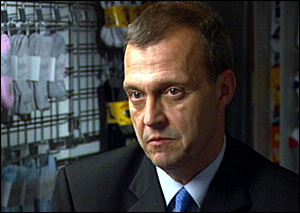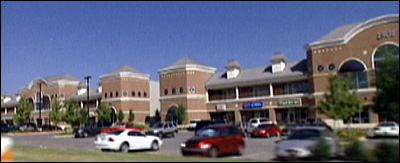The Wal-Mart Way
part 1 2 3
 | Bill Nichol, president of Kentucky Derby Hosiery | |
Bill Nichol is president of Kentucky Derby Hosiery, a Wal-Mart supplier.
"They force all of us," says Nichol, "by really good business discipline, to be sure we're paying attention at all times to what their customers want to buy."
If manufacturers want to do business with Wal-Mart, they often have to change the way they run their business. Not too long ago, manufacturing companies set consumer prices, created product lines, and dictated production schedules. Not anymore.
Nelson Lichtenstein, a professor of labor history at University of California, Santa Barbara, says today these decisions are increasingly driven by retailers like Wal-Mart.
"The power of Wal-Mart is such," says Lichtenstein, "it's reversed a hundred-year history in which the manufacturer was powerful and the retailer was sort of the vassal. It's changed that. It turned that around entirely."
Bill Nichol says it even changes where you do business. "If you want to sell Wal-Mart, you need to come to Bentonville."
Consumer manufacturing companies have flocked to Bentonville to set up satellite sales offices near Wal-Mart headquarters. They call it "Vendorville".
 | "Vendorville" | |
"They're here for one reason: Wal-Mart," says Nichol. "And it is a phenomenon. It's a whole world of its own."
Office parks in this small Arkansas town are filled with sales offices for some of the biggest consumer product manufacturers in the world. They're here for one reason: to be at the beck and call of their biggest customer.
"Wal-Mart calls the shots," says John Lehman. "'If you want to do business with us, if you want to stay in business, then you're going to do it our way.' And it's all about driving down the cost of goods."
Lehman says even Wal-Mart's biggest suppliers get pushed around. Their company representatives get herded into in to little gray cubicles in Wal-Mart's headquarters where Wal-Mart uses its purchasing power to press costs lower and lower.
"It's very one-sided," says Lehman. "There is no negotiation. There is very little negotiation at all. I've been in these little cubicles. I've seen it happen. … They know every fact and figure that these manufacturers have. They know their books. They know their costs. They know their business practices - everything you know. So, what's a manufacturer left to do? They sit naked in front of Wal-Mart."
Bill Nichol at Kentucky Derby Hosiery has been in those bargaining sessions too.
"Their message to us, surprisingly," says Nichol, "[is] if you want to focus on the lowest-cost part of the market, it's obvious that you can't do that in the United States."
In other words, Wal-Mart is saying that if you want to access to its big low-end market, that means moving production to China.
Nichol confirms, "China, practically speaking, is it. That is the low-cost producer for the immediate future."
"It basically tells its suppliers, "We need to get those products at 30 percent lower price. You need to move to Asia. You need to move to China, because that will meet our bottom-line price figures."
Next - part 3
| 
